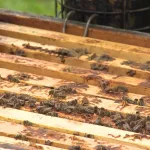
MIDDLEBURY, Vt. (WCAX) – A new report says Vermont’s honeybees are thriving, but beekeepers argue the numbers are misleading.
Most honeybees at Champlain Valley Apiaries used to make it through the winter. These days, beekeepers Charles and Curtis Mraz say winter is a death trap.
“We spend three weeks just cleaning dead bees out of equipment,” said Curtis Mraz of Champlain Valley Apiaries.
The Mrazs once comfortably maintained more than 1,000 honeybee colonies. Now, their colonies dip as low as 400.
Climate change, habitat loss and mites are contributors, but they say agricultural pesticides like neonicotinoids are their biggest killers. And smaller colonies mean less resilience through harsh Vermont winters, typically the deadliest time for honeybees.
“It’s like being on a bicycle up against a wall, you know? You’re just pushing as hard as you can but you can’t get ahead. We can’t get our numbers back up,” Chas Mraz said.
A recent report by the Vermont Agency of Agriculture, Food and Markets suggests otherwise. They track a 43% increase in registered honeybee colonies from 2016 to now.
State Pollinator Health Specialist and Apiculturist Brooke Decker, who authored the report, says the numbers speak to a flourishing beekeeping industry.
“We have great beekeepers in the state, some very famous, world-renowned, hardworking beekeepers in the state. So I would say the industry is definitely thriving,” Decker said.
Others argue the numbers tell a different story.
“It’s not the bees are fine. The bees are not fine,” Chas Mraz said.
Of the more than 17,000 honeybee colonies reported in Vermont in 2023, the Agency of Agriculture says just over 9,000 of those lived in Vermont year-round. The rest were transported to warmer states over the winter.
Pollinator Ecologist Samantha Alger believes migratory honeybees aren’t good indicators of the success of Vermont beekeeping.
“If we want to talk about the true Vermont beekeeping industry and the health of that Vermont beekeeping industry, I think it would be important to look at the honeybees that are here year-round,” Alger said.
Agency numbers show an approximate 15% increase in year-round or stationary registered honeybee colonies since 2016.
But some experts tell me they’re wary of these numbers. They believe a rise in beekeeper registration and an improved state database, not improved bee health, could account for the reported increase in colonies.
Beekeepers say winter loss of stationary registered colonies is a better indication of honeybee health. In 2022, state numbers show nearly one-third of stationary colonies died.
“We’re bee replacers, not beekeepers,” Chas Mraz said.
Beekeeper Andrew Munkres with the Vermont Beekeepers Association says commercial beekeepers are at their wits’ end.
“It’s not sustainable,” Munkres said. “You can’t financially take that kind of a hit year after year and keep going.”
Beekeepers add that the threats to honeybees threaten all pollinators.
They hope the state recognizes their struggle and finds a more accurate way to report pollinator health.
